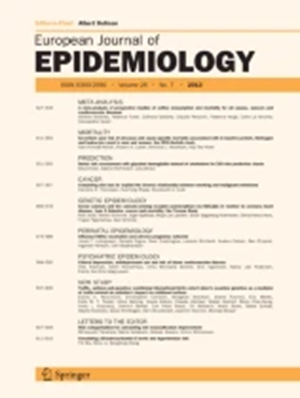瑞典MS寄存器的完整性和通用性。
IF 5.9
1区 医学
Q1 PUBLIC, ENVIRONMENTAL & OCCUPATIONAL HEALTH
引用次数: 0
摘要
瑞典多发性硬化症(MS)登记是一个全国性的临床工具和研究数据库。其在更广泛的多发性硬化症人群中的普遍性此前尚未得到评估。我们的目标是量化登记的完整性和被纳入者和未被纳入者之间的潜在差异。使用相关的国家登记册,我们将截至2020年12月的多发性硬化症患者确定为在国家患者登记册中诊断为≥3例多发性硬化症的患者。我们评估了MS登记的完整性,并比较了纳入和未纳入人员之间的特征,使用重叠加权来解释年龄差异。在21320例多发性硬化症发病(2020年)和7355例多发性硬化症发病(2011-2020年)中,多发性硬化症登记的完成率分别为85%和87%,但各县差异较大(2020年为67-94%)。未纳入登记册的流行病例年龄较大(平均62.4岁对52.3岁),更可能没有工薪收入(55.3%对30.5%);受教育年限较短(20.8% vs.≤9年的12.0%);住院次数较多(41.5%比32.2%);并且收集了更多独特的处方药(中位数为每年7种vs. 5种)。发病病例在首次诊断多发性硬化症时的年龄也较大(平均50.3岁对39.2岁)。通过调整年龄,所有的差异都减弱了,尽管差异仍然存在。瑞典多发性硬化症登记册显示出较高的完整性,但可能不能完全代表老年多发性硬化症患者、晚期诊断患者和社会经济地位较低的患者。在解释基于寄存器数据的结果时,应考虑这些限制。本文章由计算机程序翻译,如有差异,请以英文原文为准。
Completeness and generalizability of the Swedish MS register.
The Swedish Multiple Sclerosis (MS) Register is a nationwide clinical tool and research database. Its generalizability to the broader MS population has not been previously assessed. We aimed to quantify the register's completeness and potential disparities between those who were included and those who were not. Using linked national registers, we identified persons with MS through December 2020 as those with ≥ 3 MS diagnoses in the National Patient Register. We assessed the MS register's completeness and compared characteristics between included and non-included persons, using overlap weighting to account for age differences. Among 21,320 prevalent (2020) and 7,355 incident (2011-2020) MS cases, the completeness of the MS register was 85% and 87%, respectively, but varied by county (67-94% in 2020). Prevalent cases not included in the register were older (mean 62.4 vs. 52.3 years) and more likely to have no salaried income (55.3% vs. 30.5%); had fewer years of education (20.8% vs. 12.0% with ≤ 9 years); more often been hospitalized (41.5% vs. 32.2%); and collected more unique prescribed drugs (median 7 vs. 5 drugs per year). Incident cases were also older at first MS diagnosis (mean 50.3 vs. 39.2 years). All differences were attenuated by adjusting for age, although disparities remained. The Swedish MS Register demonstrates high completeness, but may not fully represent older persons with MS, those diagnosed later in life, and those of lower socioeconomic status. These limitations should be considered when interpreting findings based on the register's data.
求助全文
通过发布文献求助,成功后即可免费获取论文全文。
去求助
来源期刊

European Journal of Epidemiology
医学-公共卫生、环境卫生与职业卫生
CiteScore
21.40
自引率
1.50%
发文量
109
审稿时长
6-12 weeks
期刊介绍:
The European Journal of Epidemiology, established in 1985, is a peer-reviewed publication that provides a platform for discussions on epidemiology in its broadest sense. It covers various aspects of epidemiologic research and statistical methods. The journal facilitates communication between researchers, educators, and practitioners in epidemiology, including those in clinical and community medicine. Contributions from diverse fields such as public health, preventive medicine, clinical medicine, health economics, and computational biology and data science, in relation to health and disease, are encouraged. While accepting submissions from all over the world, the journal particularly emphasizes European topics relevant to epidemiology. The published articles consist of empirical research findings, developments in methodology, and opinion pieces.
 求助内容:
求助内容: 应助结果提醒方式:
应助结果提醒方式:


